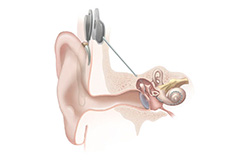
Get Free Treatment Plan From Top Hospital
Attach Medical Report
Cochlear Implants: Types, Surgery, Cost, Benefits, Risk, and Recovery
Are you tired of living with constant sinus infections or struggling to hear conversations? If so, ENT surgery may be the apt thing that can improve your quality of life. From correcting hearing loss to addressing sleep apnea, various procedures fall under the umbrella of ear, nose, and throat (ENT) surgery. But before going under the knife, it’s essential to understand what these surgeries entail and how they can benefit. You will get details about cochlear implants, types, surgery, cost etc.
ENT surgery is done on the head or neck to treat ear, nose or throat problems. It is also known as ENT (ear, nose and throat) surgery. Otolaryngologists are doctors trained to treat patients with ear, nose and throat conditions.
If you are considering a cochlear implant for yourself or a loved one, there is much information out there. This overview will cover the basics of the surgery and its complications.
When you are ready to get a cochlear implant, your doctor will first ask about your hearing. If you have severe to profound hearing loss, your doctor may recommend that you have surgery as soon as possible after diagnosis to get the best chance of success. Cochlear implants send electrical signals directly to the auditory nerve (the nerve that sends sound signals from your ear to your brain).
A cochlear implant is a technological advancement that aids hard-of-hearing individuals in comprehending spoken language. Between the outer ear and the brain is the place a surgeon inserts the cochlear implant. Direct electrical signals pass from the implant to the brain. It helps to recover the hearing loss partially. It frequently restores the majority of lost hearing capacity.
For many deaf persons, cochlear implants can offer significant alleviation without requiring surgery. You should be conscious of the implant’s potential and its side effects.
Several types of cochlear implants are available, and each has its benefits and drawbacks. Choosing an implant that is right for you is essential based on your needs. Some people find that single-channel implants work well for them, while others may prefer multichannel devices. Anyone considering a cochlear implant should speak with their doctor about their options to get the best possible outcome.
Adults of all ages and children 6 to 12 months old can benefit from implants.
People who have cochlear implants report improved:
- Ability to hear speech without visual aids such as lip reading
- Recognition of everyday environmental sounds
- Ability to listen in noisy environments
- Ability to identify the stream of the noise
- Ability to hear television programs, music, and telephone conversations
- Signs of ringing or buzzing (tinnitus) in-ear implants
To get eligible for a cochlear implant, you need to have
- Hearing loss that interrupts spoken communication
- Poor results of hearing aids determined by special hearing tests
- Motivation to participate in hearing care and the world of hearing
- Realistic presumption of advantages and disadvantages of cochlear implants, what they can and can’t do for hearing.
Who could benefit from having a cochlear implant?
Studies suggest many people could benefit from a cochlear implant, but only 2% have implants. Complete hearing loss is not necessary to get benefit from a cochlear implant.
The U.S. Food and Drug Administration (FDA) has approved cochlear implants for people with moderate, profound, or severe hearing loss. It includes hearing in both ears, hearing loss (hearing loss) in one ear, or a decrease in usual sound, moderate to severe hearing loss. Children age 09 months and older may have cochlear implants.
If you can hear with hearing aids, but your ears are working, and you still cannot understand speech, you can have a cochlear implant.
In general, a doctor will recommend a cochlear implant if:
- Severe hearing loss in one or both ears.
- Use hearing aids but still would like to hear better.
- Not having any health problems that will increase the risk of surgery.
Cochlear Implant surgery-Symptoms
If you are considering surgery for cochlear implantation, be sure to speak with your doctor about all the potential symptoms that may occur. Some common symptoms include:
- Difficulty understanding speech.
- Trouble hearing in noisy environments.
- Earache or pain after surgery.
- Swelling or drainage from the ear following surgery.
- Tinnitus (ringing in the ears).
Cochlear implant surgery- Pre-procedure
Most people considered for cochlear implant surgery have normal hearing at additional frequencies, like speech. However, because patients with severe hearing loss frequently have trouble comprehending speech, their doctors will additionally check their capacity for understanding spoken language using the Hearing Status Inventory (HSI), a speech evaluation test. If a person’s hearing loss is severe enough, they don’t match all the requirements for cochlear implant surgery.
The degree of hearing loss is the prime factor in determining whether they should have cochlear implant surgery. People who qualify for cochlear implant surgery have extensive deafness, which limits their ability to hear sounds above Grade 3 on an audiometer.
Before the surgery, a few tests are a must to ensure the recipient is a good candidate for the implant. These tests include an audiology exam, a speech assessment, and a hearing test.
These tests include a hearing test, an MRI head scan, and a psychiatric evaluation.
The hearing test can measure how well the patient can hear. This test has a louder sound than the patient can generally hear. This test will help determine which type of cochlear implant is more suitable for the patient. The two most common types are the inner ear implant and the external auditory canal (EAC) implant.
The following tests are the tests;
an audiogram (a hearing test), a speech evaluation test, and a psychological evaluation test.
You will need an MRI to check for structural damage to your ears. An MRI scan of the head checks to see if any problems with the brain or ear could cause deafness. The psychiatric evaluation shows if the patient is stable enough to undergo surgery. It is just a precautionary measure, and there is no guarantee that surgery will be necessary if there is no structural damage.
Before the procedure
You or your child will need a detailed medical analysis to determine if cochlear implants are a good option. Healthcare providers will conduct an assessment that may include the following:
- Hearing, speech and sometimes balance tests
- Physical exam to assess health and anatomy
- MRI or CT scan of the skull to determine the condition of the cochlea and inner ear
Cochlear implant surgery- During the procedure
The surgery is done under general anaesthesia and typically takes about one hour. Cochlear implant surgery is generally done on people who are at least 18 years old, have advanced stages of hearing loss, and don’t have any other options for treatment. The procedure for a cochlear implant is comparable to other ear procedures.
The procedure itself is simple and typically lasts two hours. The first step entails an incision above your ears on either side of your head. It will allow the surgeon to remove a portion of the skull bone before inserting a titanium frame into the empty region. The doctor will clean out the ear of any infection and extra tissue before creating a hole for the implant. The device will then be fastened to the orifice by the doctor using screws or rods. The frame assists in holding the implant in place as it heals and supports it.
There are two types of cochlear implants: One is Internal while the other is External.
Internal cochlear implants are inserted into the middle ear (behind your eardrum) and transmit audio signals directly to the cochlea in the inner ear.
External cochlear implants sit on top of your ears and send audio signals through the bones to the inner ear.
The electrodes will then be mounted onto the frame by the surgeon. These electrodes support the direct delivery of electrical impulses to the auditory nerve. After being implanted, these electrodes will be attached to an additional device, such as a power source or an amplifier, to stimulate the implant. The doctor will use stitches or glue to close the opening once the implant is in place.
After this initial setup, most patients can return home with little discomfort and without needing medicine or other care beyond routine appointments with their doctor. After four years of wearing, the average patient has outstanding outcomes.
There are two types of cochlear implants: receiver-implanted and speech processor-implantable. Receiver-implanted devices are embeddings alongside an existing ear canal.
Speech processor-implantable devices are placed under the skin on either side of the neck, just below the jawline.
The type of cochlear implant a person receives depends on their needs and preferences. Some factors that may influence whether someone gets a receiver-implanted or speech processor-implantable device include age, sex, history of head injury, language skills, the severity of deafness, and degree of hearing loss.
Surgery for a cochlear implant is generally considered safe and relatively easy compared to other types of surgery.
After a few hours of observation, the patient is discharged and can stay at home. All hearing on one side of the implant will be a little different after surgery – the device will be within a few weeks’ incisions to heal. During this time, you cannot use a hearing aid in the ear that had surgery.
Cochlear implant surgery- post-procedure (post-care)
After your cochlear implant surgery, you must take specific precautions to ensure a successful outcome. Here are some critical post-surgery tips:
- Rest: After any major surgery or procedure, avoiding strenuous activity for the first few days is essential. It will help your body heal.
- Keep Your Head Cool: It is essential to keep your head cool after surgery to minimize swelling and pain. To reduce swelling and reducing pain, placing a cold pack on your forehead or ice on your neck for 15 minutes every few hours can help.
- Avoid Swimming or Water Sports: Swimming and other water sports can cause excessive water retention and worsen the swelling around the implant site. Wait at least ten days after surgery before engaging in these activities.
- Eat a Well-balanced Diet: Eat a well-balanced diet after surgery to help improve healing and reduce inflammation. Consume plenty of protein, fibre, fruits, vegetables, and fluids to avoid putting extra pressure on the surgical site. Avoid processed foods and alcohol, which can further add to inflammation.
After surgery, patients will require post-operative care. It usually includes taking prescribed medications and resting as much as possible. Patients should have keen monitoring for signs of infection, such as fever or chills. Additionally, they will need to have their hearing checked regularly by a doctor to ensure the cochlear implant is still functioning correctly.
Cochlear implant surgery- risks and complications
The procedure is done under general anaesthesia and usually takes about an hour. There are some risks and complications associated with the surgery, but most people recover quickly and enjoy improved hearing.
Some risks of cochlear implant surgery include infection, nerve damage, and problems with the implant itself. Infection may occur after the surgery due to debris left in the wound or from another source, such as saliva. Nerve damage may result from removing tissue or closing enormous harm. Problems with the implant can include electronic corrosion, mechanical failure, and device rejection.
Most people who undergo cochlear implant surgery experience good outcomes, including improved hearing, decreased reliance on assistive listening devices, and increased independence. However, there are always potential complications that may arise during any surgery, so it is essential to discuss all options with your doctor before deciding whether or not to have the procedure done.
There are many risks and complications associated with cochlear implant surgery, but the good news is that these can be inadmissible through careful planning and execution. Observe the following crucial information:
Risks of Cochlear Implant Surgery
Cochlear implant surgery is relatively new, so there is still some uncertainty about its risks and benefits. In general, however, there are several potential risks associated with cochlear implant surgery. These include:
1) Damage to the auditory nerve or other nerves supplying hearing function. It can occur if the surgeon needs to be more careful when removing or manipulating the eardrum or if they use too much force during surgery.
2) Infection. It is common in patients with prior surgeries or severe ear infections before their cochlear implant surgery. Infection can spread to the surgical site and cause serious complications, including hearing loss and death.
3) Scarring. Scarring may form around the implant area due to surgery, infection, or other complications. It can make it difficult for patients to hear well, leading to further hearing loss.
4) Hearing loss. Even if an implant works perfectly at first, it may lose effectiveness over time due to damage caused by infection or scarring. It can result in significant difficulty understanding speech and communicating effectively – even if you’re doing fine on standard tests measuring.
Complications are rare and can include:
- Bleeding
- Facial paralysis
- Infection at the surgery site
- Device infection
- Balance problems
- Dizziness
- Taste problems
- New or worsened ear noise (tinnitus)
- Spinal fluid leak
Typically, recovery takes six weeks. To avoid infection, you must take antibiotics both before and after surgery. You can suffer ringing noise in your ears following surgery for a few weeks or months. Medication can lessen this. While your ears recuperate, you must also refrain from loud noises and physically demanding activities for a few weeks or months.
Living with a cochlear implant
You will wear this implant for the rest of your life, and it will be like working with a doctor and surgeon throughout your life. You will have regular appointments so that your assessment team can verify
- Your device is working well.
- The settings on your device are operating at their best
- Your skin at the site of the magnet is healthy.
A cochlear implant can be a life-changing device. However, in addition to improving your hearing, you will also have to deal with issues such as:
Things to avoid
- You cannot use certain medications, including ionizing radiation therapy, electrosurgery, or neurosurgery.
- Hitting the field can affect your implants as the area is in contact with the implant.
Best ENT Hospitals in India for Cochlear Implants
The healthcare industry in India is rapidly developing and acquiring the latest techniques to ensure the best treatment for patients of all age groups. The ENT hospitals in India have doctors trained to use modern equipment for cochlear implants. The facilities in top ENT hospitals bring convenience for patients to get all the tests and reports under the same roof. The ENT hospitals maintain cleanliness and hygiene and a positive ambience, which helps patients to recover from the post-procedure routines. India has several hospitals throughout the country to treat national and international patients upon their choice of hospitals. Following is the list of a few hospitals
Indraprastha Apollo Hospital, Delhi
Max Super Specialty Hospital, Saket, Delhi
Artemis Hospital, Delhi
Jaslok Hospital, Mumbai
BLK, Super Specialty Hospital, New Delhi
Fortis Hospital (FMRI), Gurgaon
Metro Hospital, Noida, Delhi-NCR
Paras Speciality Hospital, Delhi-NCR
Fortis Hospital, Mumbai
Batra Hospital & Medical Research Centre, Delhi
Kokilaben Dhirubhai Ambani Hospital, Mumbai
Gleneagles Global Hospitals, Hyderabad
KIMS Hospital, Secunderabad, Hyderabad
MaxCure Hospital, Madhapur, Hyderabad
Apollo Health City, Hyderabad
MGM Hospital, Chennai
Best Otolaryngologists in India for Cochlear Implants
The hospitals in India are associated with the best Otolaryngologists to serve patients irrespective of age, health condition and stage of the disease. The top doctors in India have special teams that monitor and care for the patients. The Otolaryngologists in India prepare a suitable treatment plan for each patient with minimal side effects so they can recover quickly. Apart from that, ENT doctors in India provide excellent services and guide the patient throughout the recovery phase. The best doctors in India are highly experienced with international practice giving the patient complete satisfaction and care. Below is a list of a few best doctors
Dr P. L. Dhingra- Indraprastha Apollo Hospital, New Delhi
Dr Sanjay Sachdeva- Max Super Specialty Hospital Saket
Dr. (Col) Subodh Kumar-Jaypee Hospital, Noida
Dr Shashi Dhar- Artemis Hospital
Dr. K K Handa- Medanta The Medicity
Dr Deepak Sarin- Medanta The Medicity
Dr Anup Sabherwal- BLK Super Speciality Hospital
Dr. W.V.B.S. Ramalingam- BLK Super Speciality Hospital
Dr Atul Kumar Mittal- Fortis Research Institute
Dr Aru Chhabra Handa- Medanta The Medicity
Dr. Yatin Mehta
Dr. Shomeshwar Singh
Cost of Cochlear Implant in India
Cochlear implants can serve as a proof and convenient source of hearing aid for hearing difficulties in patients. These implants help people to lead a more comfortable life with better understanding. Cochlear implants can be in two forms therapy and surgery. The cost of cochlear implants in India can vary from one person to another depending o the procedure, area, hospital, and type of implant. The cost of an implant (cochlear surgery) in India is much more reasonable, cheaper and of best quality than the other countries. Due to the excellent care and treatment, India has gained a high reputation globally for medical hospitability. The best hospitals to treat ENT patients are spread across India, so the cost of treatment can vary depending on the city and hospital.
Cochlear implant cost
Minimum Cost Rs. 65870
Average Cost Rs. 430000
Maximum Cost Rs. 873600
Cochlear implant cost based on cities
Bangalore- Rs. 65870 to 873600
Chennai- Rs. 65870 to 873600
Hyderabad- Rs. 65870 to 873600
Kolkata- Rs. 120000 to 225000
Mumbai- Rs. 65870 to 873600
New Delhi- Rs. 65870 to 873600
Pune- Rs. 65870 to 873600

Top Cochlear Implant Surgeons in India
If anyone here looking for best cochlear implant surgeon in India who can treat you with an effective and reasonably priced surgery; that is when Al Alfiya Meditour can help you. We are a renowned medical tourism company tied up with various hospitals and have contacts with many famous surgeons that provide the best cochlear implant surgery in India. Our experts are ready to assist you in making that connection. Al Afiya Medi Tour provide all the information you need to know about the specialists in their field. You can book an appointment online with the top Cochlear Implant doctors in India: Faridabad, Noida, Delhi, Gurgaon, Chennai, or Mumbai.

Best Cochlear Implant Hospitals in India
When it comes to choose the best cochlear implant Hospital in India; it is a very crucial decision. Cochlear implants are the kind of surgery that is very complicated and crucial. Especially when you are a person who does not reside in India, you will probably be confused about which hospital to look for. At Al-Afiya, we believe in delivering our customers the greatest quality of medical treatment and medical knowledge at costs that give the most value for money to the patients. We provide a comprehensive variety of surgical and non-surgical alternatives that are sourced from prominent hospitals in India.
Our staff is made up of specialists who are highly qualified and have tremendous expertise. These professionals are available to you around the clock, seven days a week, and they provide comprehensive support covering every aspect of all of your medical needs and emergencies. Beginning with giving treatment-specific estimates from the top hospitals and physicians, completing visa arrangements, arranging for lodging while in India, maintaining continual engagement with the treating doctor and hospital, and being in constant contact for post-treatment feedback. Al Afiya Medi Tourhas formed partnerships with a number of highly regarded hospitals, including Fortis, Medanta, Apollo, and Manipal, amongst others. This broadens the scope of our capabilities and gives patients a variety of options to select from when it comes to their treatment at prices that offer excellent value for the money spent.
Rehabilitation Process In Cochlear Implants
Your brain will need to be retrained to comprehend the sounds received via the cochlear implant during rehabilitation. It will sound different to you regarding speech and the familiar sounds you hear in your surroundings.
It will take time for your brain to figure out what these noises signify. This is a continual process, and the best way to obtain the desired results is to have the sound0 processor in your ear while you awake.
Suppose you want to get the most out of your cochlear implants. In that case, it is essential to have ongoing, routine follow-up appointments when the device may be checked and programmed and auditory testing.
Book An Appointment for Cochlear Implant

Get Free Treatment Plan From Top Hospital
Attach Medical Report

Cost of Cochlear Implant in India
Because medical care in India is so much more reasonably priced than in most other countries, it has quickly become one of the most popular destinations for those seeking medical treatment from all over the world. You should be aware of the cost of Cochlear Implant therapy in India if you are considering receiving treatment for a cochlear implant in India. The price of therapy or surgery for a cochlear implant in India might vary greatly from one hospital to another, as well as from city to city, and it also is contingent on the doctor’s charge. Contact us at any time, day or night, 365 days a year, if you want to find out how much the Cochlear Implant procedure in India will cost you.

Success Rate of Cochlear Implant in India
The outcomes of surgery to insert a cochlear implant might vary significantly from patient to patient. The age at which hearing loss first occurred and the amount of time that has passed between hearing loss and the procedure to implant a cochlear device are two factors that may influence the success of a cochlear implant.
When it comes to children, obtaining a cochlear at a young age tends to provide the greatest outcomes, especially when the child is born with a substantial hearing loss.
When it comes to adults, the most remarkable outcomes are often connected with a time of significant hearing loss that was shorter before the implantation of the cochlear device. Although adults who have had little or no contact with sound generally are likely to profit less from cochlear implants than people who have had more exposure to sound, both groups of adults typically improve following cochlear implantation.
The following are examples of possible outcomes:
- A better understanding of hearing the use of the device may ultimately result in improved hearing for most persons who fulfill the hearing requirements for cochlear implantation.
Your tinnitus can get improved. Although ear noise (tinnitus) is not the main reason to acquire a cochlear implant, it is possible that the cochlear implant, when in operation, may partly suppress or ameliorate the intensity of tinnitus. Tinnitus intensity may sometimes get worse as a result of this.
Contact Form
Attach Medical Report
Top Doctors & Surgeons in India
Why Choose Us

Personalized Care
24x7 Supports
Top NABH and JCI accredited Hospitals
Free Cost Estimation & Medical Opinion from Specialist
Get Free Tele/Video Consultation
Visa and Traveling Assistance
Post-surgery with Assistance in Follow-ups
























